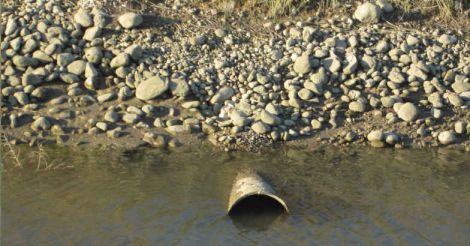The unacceptable and unhygienic practice of open defecation in rural India is an important socio-cultural, environmental and health issue that needs serious attention from all corners. Over the last two decades, the popularity and success of establishing rural latrines across the length and breadth of India has certainly gained momentum. However, it is still way below the target and will need serious efforts from the central and various state governments, NGOs, national, regional and international health and environmental agencies and active participation of the local administration.
India has several serious socio-cultural issues impacting the life of rural as well as urban areas like girl infanticide, dowry related violence, alcohol and substance abuse based family violence, communal riots, political violence, superstitions, honor killings, discrimination based on gender, caste, creed, religion, language, sexual orientations, education and ethnicity.
 Photo: Saikat Kumar Basu
Photo: Saikat Kumar BasuThe challenges of open defecation is no less than any of the other socio-cultural dilemmas that India face as a modern nation and is a serious obstacle in the path of rapid advance and modernization.
Traditional faiths, beliefs, superstitions and cultural habits are behind all such social evils, including open defecation that is a humiliating and disgusting experience for a modern nation like India, which represents the largest democracy of the planet. This important issue has been carefully swept below the carpet for a long time and needs to be critically addressed to find suitable alternatives and sustainable solution. The greatest obstacle in eradicating open defecation as an unacceptable sociocultural and unhealthy practice that has been in common use for centuries is lack of education, awareness and ignorance and/or indifference among the rural communities. So, it is impossible to completely eradicate this bad cultural habit overnight.
 Photo: Saikat Kumar Basu
Photo: Saikat Kumar BasuThis will need substantial rural door to door campaigns, step-by-step removal of superstitions and illiteracy among various ethnic communities and rural settlements, along with spread of proper environment and health education and awareness.
Local rural administration like the gram (village) panchayats need to be brought to the forefront of the rural latrine establishment campaign to deal with such socio-cultural challenges. Panchyats are effective local administrative units with strong connection to the local block development offices across India and hence, needs to be geared appropriately to carry out year-long, innovative awareness campaigns for the rural communities to which they are catering to.
Furthermore, the rural children and womenfolk should be made the primary targets as one of the cornerstones of any traditional rural family units. School education should target to make the children aware of the negative health and environmental impacts of the ugly practice of open defecation.
Rural women must be helped to realize the importance of latrines. Such modern latrine units incorporated within domestic, rural residential houses or dwellings will help in improving the local environment, health and contribute towards women empowerment. Furthermore, the progress and popularity of rural latrine schemes are associated with women security and safety. Several reports across the nation have highlighted that rural women leaving house premises for open defecation during late evening or midnight or early hours of the dawn have been subjected to multiple cases of kidnapping or abductions, sexual molestations, gang rapes, murder and mutilation. The modesty and integrity of women in rural India is being seriously jeopardized by making unguarded and/or unprotected rural women vulnerable to various social crimes by subscribing to the unhealthy practice of open defecation.
 Photo: Saikat Kumar Basu
Photo: Saikat Kumar BasuThe practice is also detrimental to human health and hygiene by exposing people to various infections and diseases; and making the locality prone to different gastrointestinal infections and diseases through contamination of human waste coming in contact with local fresh water body resources, commonly used for the purpose of drinking and various domestic uses.
Rain or irrigation water carrying chemical residues and human wastes contaminating local water bodies is a serious ecological, environmental and health issue impacting rural life quality. Accumulation of human waste into water adds undesirable microbes into the water making it unsuitable for drinking and other domestic uses by attracting various harmful disease causing microbes to build their population in such contaminated water.
The unacceptable stench in the air in and around local areas that are being extensively used for open defecation is a site for serious microbial, fungal and insect infections that negatively impact local environment and human health and needs to change.
Making subsidies available through local panchyats for helping village based family units to incorporate modern latrine inside their residential units can provide a financial incentive for villagers subscribing to modern latrine facilities instead of open defecation.
 Photo: Saikat Kumar Basu
Photo: Saikat Kumar BasuConstant educational and awareness campaigns will be needed in local languages. Furthermore, if presence of a modern latrine unit be made mandatory for 100-day job applications, panchayat loan applications, opening bank accounts, school or college admission, death, birth and marriage registration. Some financial incentives could be also included to attract people who resent the idea of using of modern latrines in the rural homes.
However, last but not the least, a change in attitude is important for making any change to happen. The Indian government has to be patient, vigilant and persuasive to carry the movement, campaign and drive forward for popularizing the use of modern latrines in rural India through various media outlets, NGOs, political parties and local administration.
(The author is a Canada and India based freelance journalist specializing in global geo-political, strategic and foreign policy issues, science & technology and environment & conservation related themes.)
Read more: Call of the Wild

























 Photo: Saikat Kumar Basu
Photo: Saikat Kumar Basu